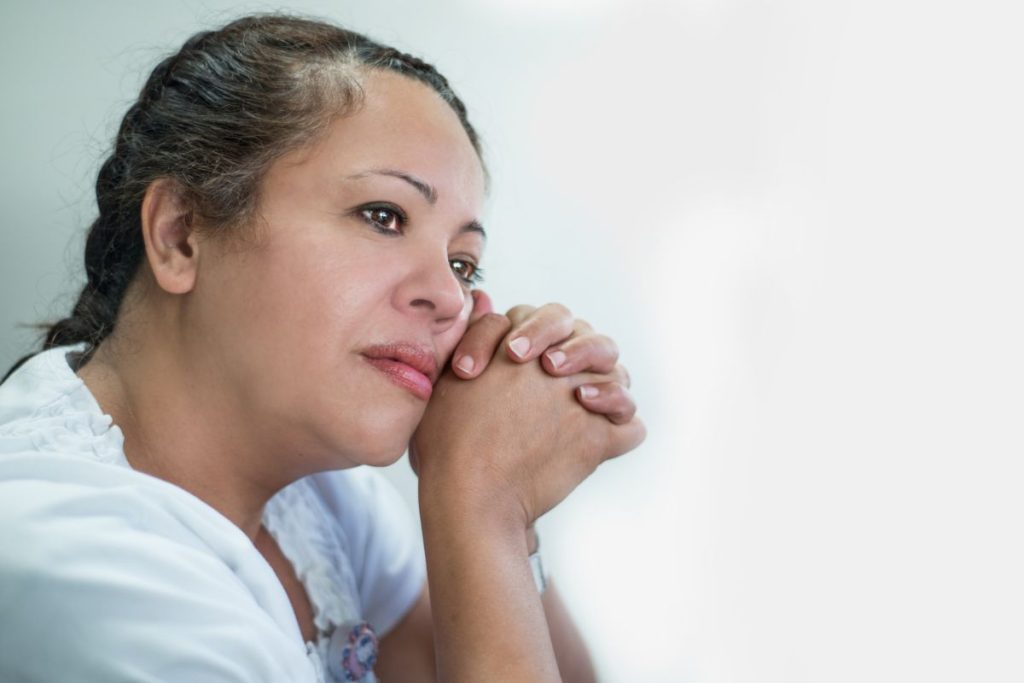How are you feeling? Truthfully! If you’re feeling down, experiencing mood swings, or struggling to understand what’s happening to your body, you may be in the early stages of the menopause transition. Perimenopause depression can look different than depression at other times in your life. Knowing the symptoms can help you get help and support early.
What is perimenopause?
Perimenopause is the time leading up to menopause before your menstrual cycle ends. Your cycle may become more irregular or lighter/heavier than your norm, hormones are in flux, and you may begin experiencing noticeable physical and emotional symptoms. This stage of the menopause journey can last about 4 years on average and up to 10 or more years for others.
What are the symptoms?
Unlike PMS, which is somewhat predictable the week before your period, there’s less predictability for perimenopause symptoms.
Some women+ experience mood swings during the menopause transition. Your mood may be erratic and challenging to manage.
You may feel emotionally volatile like you’re riding a rollercoaster.
Add in brain fog, which can make it difficult to concentrate and maintain focus, and you may feel like you’re losing your mind or raise concerns about potential early dementia.
No wonder some women+ may be more likely to feel depressive symptoms during the menopause transition, especially perimenopause.
These new symptoms may be alarming and frustrating if you’ve never felt this way. The symptoms can impact your mental health and personal and professional relationships.
Take the symptoms seriously, and seek help when needed. You are not alone!
What is depression?
Depression is a mood disorder which may present as persistent sadness, withdrawal from activities one used to enjoy, difficulty sleeping, change in eating habits, and slowing down. In some people, it can show up as anger.
It can impact you physically, mentally, and socially.
Women are 70% more likely to suffer from depression than men during all stages of life. And some studies report a higher risk for depression during the menopause transition, specifically in perimenopause.
Other research suggests that there may be an increase of depressive symptoms, but not a greater risk of clinical depression except in those with a prior history of depression.
A review of studies by The Menopause Society found that 45-68% of perimenopausal women report increased depressive symptoms.
Talk to your doctor about your concerns, no matter how big or small they may seem, and recognize how you’re feeling without judgment.
It’s essential to be aware of the symptoms and be honest with your doctor and yourself about how you’re feeling.
Perimenopause depression
We often think of depression as “feeling blue,” but the SWAN study indicates it’s not necessarily how women+ feel in perimenopause.
Instead, perimenopause depression may make you feel:
- nervous
- irritable
- moody
- difficulty with sleep*
- low libido*
- reduced or no appetite
- low energy*
- lack of concentration*
*Source: The Menopause Society
Other times, depression during the hormonal transition presents with “classic” symptoms in combination with menopause-specific symptoms like hot flashes, night sweats, and sleep disturbances.
Since the depressive symptoms during menopause can vary as much as menopause symptoms can, let’s consider all the symptoms identified by The Menopause Society.
Talk to your doctor if you’re feeling any of these symptoms most of the day, nearly every day, or for at least two weeks:
- Mood volatility.
- Persistent sadness, anxiety, or “empty” mood.
- Feelings of hopelessness or pessimism.
- Feelings of guilt, worthlessness, or helplessness.
- Loss of interest or pleasure in hobbies and activities.
- Decreased energy or fatigue.
- Moving or talking more slowly.
- Feeling restless or having trouble sitting still.
- Difficulty concentrating, remembering, or making decisions.
- Difficulty sleeping, early-morning awakening, or oversleeping.
- Appetite and/or weight changes.
- Aches or pains, headaches, cramps, or digestive problems without a clear physical cause and/or do not ease even with treatment.
- Thoughts of death or suicide or suicide attempts.
Some researchers have reported factors associated with a greater risk of depressive symptoms during the menopause journey include:
- surgical menopause
- stressful life events
- adverse experiences during childhood
- being in a racial/ethnic minority
- higher BMI
- issues with finances
- unemployment
Call 9-8-8
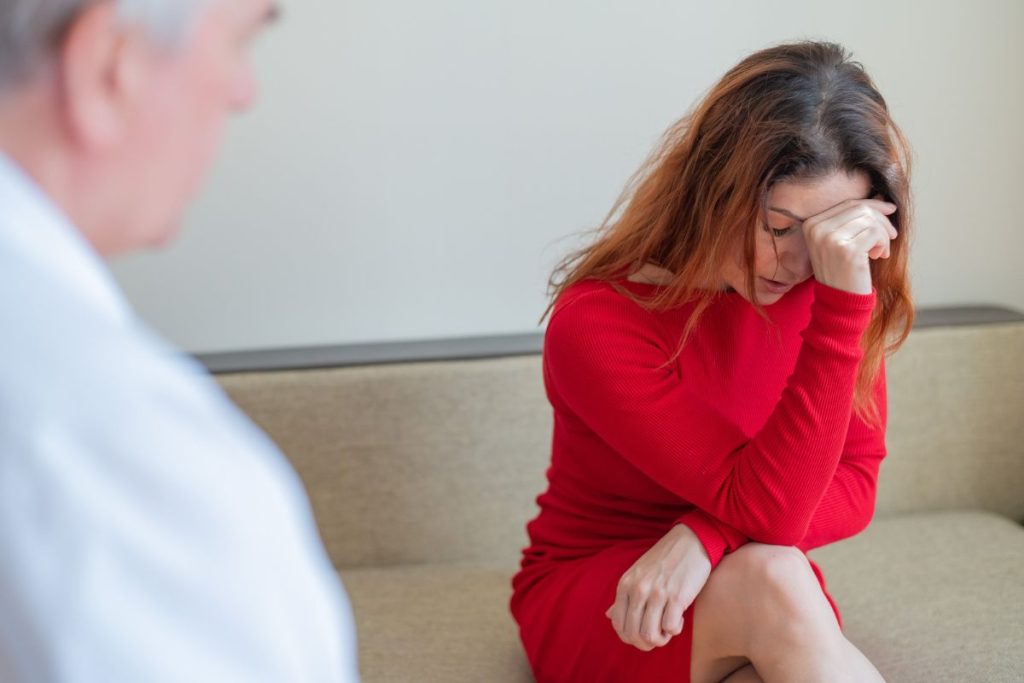
Depression diagnosis
Since the menopause journey and depression can be intertwined, and the symptoms may overlap, you may want to seek the advice of a menopause specialist. They can holistically consider the best course of treatment for your depression and menopause.
Studies show many doctors don’t receive adequate training in menopause management. So, your doctor may not bring up the menopause journey and/or the depressive symptoms some women+ experience.
There has been a greater focus on the postpartum period following delivery and a greater focus on the impact the hormonal shifts can have on a person’s mental health. However, the same may not be true when women+ are undergoing the hormonal transition which happens during perimenopause. Depression may not proactively come up as a topic of discussion with your healthcare practitioner.
Menopause is not an area of specialty for which there is currently a board certification process. However, Certified Menopause Practitioners have passed a menopause competency exam by The Menopause Society.
There is no standardized menopause-specific depression evaluation. So, your doctor may use a combination of assessments for a diagnosis.
The Menopause Society provides clinicians with a survey that evaluates how menopause impacts your life. It’s called the Utian Quality of Life Scale (UQOL). And there is The Menopause-Specific Quality of Life Questionnaire (MENQOL) which covers some depressive symptoms but not others like concentration issues, social withdrawal, or low self-esteen.
Other resources include the Quick Inventory of Depressive Symptomatology (QIDS). While you can take this online and see your score, you should still consult a doctor.
The PHQ-9 is a common tool for general depression screening.
Depression is one of the most successfully treated illnesses.
Depression treatment
Even if your symptoms don’t meet the criteria for a clinical diagnosis of depression or major depressive disorder (MDD), don’t discredit your feelings. How you feel can still impact your overall well-being and should be addressed during perimenopause, especially given some symptoms, e.g., insomnia, can increase your risk of depression.
So, focus on managing your menopausal symptoms, and your mood may improve. Don’t let menopause control you. You have many options to help control it!
For example, physical activity can be as effective as antidepressant medication in some people and may also reduce the severity of menopausal symptoms and the risk of several chronic conditions, which is increased as a result of the hormonal changes. And this stage of life can be a great time to check out mind-body exercises to help improve your mood.
If you’ve received a diagnosis of depression, find hope in the fact that it’s considered one of the most successfully treated illnesses.
Talk with your doctor about the best course of action, as treatment recommendations can vary within the U.S. and across the globe.
The Menopause Society and National Network of Depression Centers evaluated treatment options, including behavioral therapy, hormone therapy, and antidepressants:
- Antidepressants are often the first line of defense against depression.
By taking certain SSRIs and SNRIs, you may also experience improvement in other menopause-related complaints like vasomotor symptoms like hot flashes.
- Hormonal contraceptives also offer mood regulation benefits for women approaching menopause.
Medication is not always necessary. Talk with your healthcare practitioner to determine if medication, therapy, non-medication options, or a combination is the best approach for you.
Cognitive behavioral therapy for menopausal depression
Cognitive Behavioral Therapy (CBT) has emerged in guidelines from the American College of Physicians as a first-line of treatment for mild to moderate depression.
It may also be used in combination with antidepressants.
Cognitive behavioral therapy is a form of psychotherapy that helps you change your thinking and behavior patterns. You’ll examine and reframe your thoughts, feelings, and behaviors.
It’s known to help depression in the general population by helping you assess and modify automatic thoughts about yourself, your current situation, and your future. CBT can also help with insomnia, for which it has been found to be as effective as sleep medication in the short term and more effective than such medicines in the long-term.
While menopause CBT studies are limited, the risks associated with CBT are low. So, The Menopause Society supports it as a reasonable option to treat depression in menopausal women.
During menopause, CBT typically focuses on stress, hot flashes, low mood, and sleep problems.
Unlike traditional mental health counseling and therapy, which may take place over a long period of time, CBT is relatively short, with a treatment course typically involving just four to six sessions.
It can improve your sleep and hot flashes, which can disrupt sleep. Both are also risk factors for depression.

Free Digital CBT (d-CBT)
Only available for a limited time!
Become a member of the pausitive health pilot program and get access to complimentary digital cognitive behavioral therapy (d-CBT) from our collaboration partner, SimpleTherapy. These sessions can relieve anxiety, stress, and depressive symptoms.
As a member, you’ll also get access to personalized text messages that focus on topics you select, virtual care, a supportive community, and more!
Lifestyle and your mindset
Don’t underestimate the power of a healthy lifestyle in improving your mood. The Royal Australian and New Zealand College of Psychiatrists says it is a strong foundation that is key to managing depression and reduces the likelihood of recurrence. You may still need antidepressants, but a healthy lifestyle can have a long-lasting impact.
The healthy basics include good nutrition, exercise, sleep, and stress management.
The physical benefits of exercise are well known, but it can also have a powerful positive impact on mental and emotional health. When depression accompanies other menopausal symptoms, physical activity can improve well-being.
If you’re struggling with depression, following an exercise routine and a healthy eating plan may be challenging. You may find yourself drinking more alcohol, smoking, or eating less healthy foods. So, consider consulting a dietician, exercise physiologist, or certified trainer to help keep you on track.
Also, ensure you have social interaction. Friends, colleagues, and supportive family members can impact how you’re feeling.
Everyone needs a safe place to vent, share, and get advice, especially when going through a significant life change like menopause.
A healthy lifestyle may not eliminate depression, especially in severe cases, but it can help improve your overall well-being and mindset. And in situations of severe depression, a treatment regimen under the care of a behavioral health professional will most likely be indicated.

Mind-body exercise
Your mind and body are interconnected systems. Physical activity can improve your state of mind, and exercises for the mind can have a positive impact as well.
Mind-body exercises can be powerful when used for low mood and depressive symptoms and can be a helpful, complementary addition to support your treatment plan for clinical depression.
With stroke victims, who are at a 33-66% risk for depression even 5-10 years after the stroke, tai chi can be used alongside other therapies to manage post-stroke depression.
Tai chi combines physical movements, breathing, and mindfulness.
You set aside negative emotions and focus on the present during tai chi. Tension can be released through body movements and mindfulness, imagery, self-awareness, and deep breathing during the session can relax your mind and body.
Mindfulness-based exercises, which focus on the present moment with a non-judgmental perspective, can also help depression, anxiety, and stress. They can help you clear your mind, as can yoga.
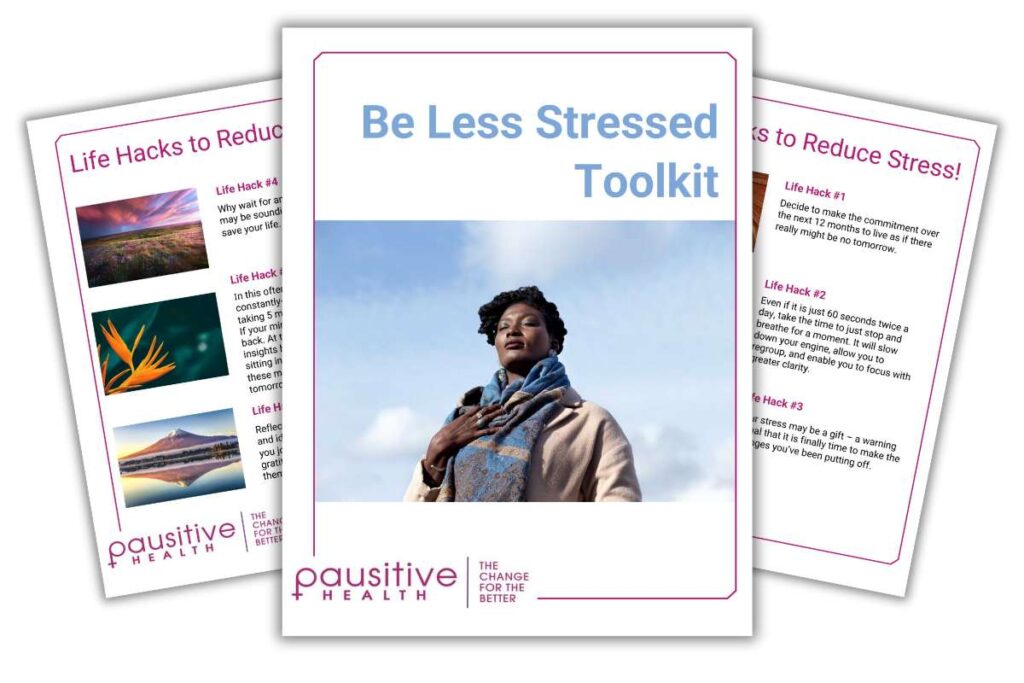
Be Less Stressed
Feeling stressed or overwhelmed? Learn life hacks to reduce stress with the Be Less Stressed toolkit.
"*" indicates required fields
Listen to music
Create a menopause journey playlist for those days you feel gloomy and need a boost of happiness.
You may “drown your sorrows” in sad music first and then switch to more upbeat songs midway through your listening session.
Or you may prefer to go right for the happy or relaxing music.
Have music on standby to help on those emotional rollercoaster days.
The lyrics, beat, tune, and artist’s voice can transport you away from the moment in time that have you feeling one way to another that changes your emotions.
Music therapy can support individuals’ psychological and emotional needs affected by an injury, illness, or disability. It’s been shown to improve self-confidence, self-awareness, and concentration.
Menopausal women can benefit from music too.
For example, practitioners use music to treat Alzheimer’s disease, which strikes women more often than men due to increased risks associated with menopause.
Music can also help cognitive recovery and negative moods in stroke victims. During the hormonal transition, women+ are at a greater risk of cardiovascular disease (CVD), including stroke.
Music has the power to transport your mind and emotions to another place.

Herbal remedies
The European Menopause and Andropause Society focuses on the use and efficacy of herbal treatments, dietary supplements, yoga, exercise, acupuncture, meditation, and other integrative modalities.
However, exercise caution with herbs just as you would with other medications.
They’re not regulated, so ingredient doses and quality may vary, and there can be safety concerns if you’re taking other medications, especially antidepressants.
If there’s one herb that stands out for mild or moderate depression, it’s St. John’s wort or Hypericum perforatum. However, the recommendations vary.
Its chemical components are similar to SSRIs, a class of antidepressant medication.
Women have long hailed soybean isoflavones as offering benefits, including depression. While studies in China and Japan show benefits, EMAS cautions there are concerns about the trial design of those studies.
Again, talk to your doctor and pharmacist to check for potential interactions or contraindications relative to the medication you may be taking as well as your particular situation with regard to factors like family history and underlying medical conditions.
Hormone therapy
Estrogen therapy (ET) is not approved for perimenopausal depression. Estrogen is also not FDA-approved for mood disturbance treatment.
However, an expert panel with The Menopause Society pointed out it can have an antidepressant effect in perimenopausal women.
The 2022 hormone therapy guidelines from The Menopause Society reiterate that positive antidepressant impact on perimenopausal women+ with and without hot flashes or other vasomotor symptoms.
In women+ with major depression who receive estrogen therapy, depressive symptoms improve with sleep improvements but not vasomotor improvements.
A window of opportunity seems to exist during the menopause journey when using estrogen therapy. However, ET was ineffective for postmenopausal women struggling with depressive disorders.
The Menopause Society encourages women to exercise caution. Talk to your doctor about the risks and benefits of HT.
International guidelines vary.
EMAS cautioned in their official statement on treating depression that menopausal hormone therapy (MHT) is not approved in the US or Europe because of insufficient evidence.
As you can tell there is no consensus when it comes to hormone therapy and depression. It’s important to speak with your healthcare practitioner – PCP, OB-GYN, behavioral health specialist – to determine the best option in your particular case.
Managing perimenopause symptoms
When you first begin to experience perimenopause depression or other menopause symptoms, it can feel like your body and emotions are controlling you. However, it doesn’t have to be like that. By managing menopausal symptoms, you can take that control back.
Start early – at the first sign of symptoms in perimenopause.
You have many options, and some are free and low risk.
While things like physical activity and mind-body exercises may not eliminate depression on their own, they are potential options to consider as not all depressive symptoms lead to a clinical diagnosis, and they can also be beneficial to overall health and well-being.
At the end of the day, you have many options to help address depressive symptoms and clinical depression. And some of these treatments are even free. So please don’t suffer in silence.
If you had a physical condition, you would likely reach out to find the treatment you need. Emotional health distress and mental health conditions are no less important. They can also negatively impact your physical health and reduce your motivation and energy to live a healthy lifestyle. Seek the help and support you need!
Call 9-8-8
Depression and Anger: What’s the Connection? | HealthCentral LLC
Brown L, Hunter MS, Chen R, et. al. Promoting good mental health over the menopause transition. The Lancet. Volume 403, Issue 10430, P969-983, March 09, 2024.
Maki P, Kornstein S, Joffe H, Bromberger J, Freeman E, Athappilly G, Bobo W, Rubin L, Koleva H, Cohen L, Soares C. Guidelines for the evaluations and treatment of perimenopausal depression: summary and recommendations. Journal of Women’s Health and Menopause: The Journal of The Menopause Society. Vol. 25, No. 10, pp. 1069-1085
DOI: 10.1097/GME.0000000000001174
Cohen L, Soares C, Joffe H. Diagnosis and management of mood disorders during the menopausal transition. The American Journal of Medicine. 2005. Volume 118, Issue 12, Supplement 2, 93-97. doi: https://doi.org/10.1016/j.amjmed.2005.09.042
Depression & Menopause | The Menopause Society
Find a Menopause Practitioner | The Menopause Society
Willi J, Ehlert U. Assessment of perimenopausal depression: A review. J Affect Disord. 2019 Apr 15;249:216-222. doi: 10.1016/j.jad.2019.02.029. Epub 2019 Feb 11. PMID: 30776662.
Utian Quality of Life Score (UQOL) | The Menopause Society
Kulkarni J, Gavrilidis E, Hudaib AR, Bleeker C, Worsley R, Gurvich C. Development and validation of a new rating scale for perimenopausal depression-the Meno-D. Transl Psychiatry. 2018 Jun 28;8(1):123. doi: 10.1038/s41398-018-0172-0. PMID: 29955034; PMCID: PMC6023883.
Quick Inventory of Depressive Symptomatology (QIDS) | MDCalc
PHQ-9 (Patient Health Questionnaire-9) | MDCalc
What Is Depression? | American Psychiatric Association
Stubbs C, Mattingly L, Crawford SA, Wickersham EA, Brockhaus JL, McCarthy LH. Do SSRIs and SNRIs reduce the frequency and/or severity of hot flashes in menopausal women. J Okla State Med Assoc. 2017 May;110(5):272-274. PMID: 28649145; PMCID: PMC5482277.
Amir Qaseem, Douglas K. Owens, Itziar Etxeandia-Ikobaltzeta, et al; Clinical Guidelines Committee of the American College of Physicians. Nonpharmacologic and Pharmacologic Treatments of Adults in the Acute Phase of Major Depressive Disorder: A Living Clinical Guideline From the American College of Physicians. Ann Intern Med.2023;176:239-252. [Epub 24 January 2023]. doi:10.7326/M22-2056
Gautam M, Tripathi A, Deshmukh D, Gaur M. Cognitive Behavioral Therapy for Depression. Indian J Psychiatry. 2020 Jan;62(Suppl 2):S223-S229. doi: 10.4103/psychiatry.IndianJPsychiatry_772_19. Epub 2020 Jan 17. PMID: 32055065; PMCID: PMC7001356.
Hunter MS. Cognitive behavioral therapy for menopausal symptoms. Climacteric. 2021 Feb;24(1):51-56. doi: 10.1080/13697137.2020.1777965. Epub 2020 Jul 6. PMID: 32627593.
Walker J, Muench A, Perlis ML, Vargas I. Cognitive Behavioral Therapy for Insomnia (CBT-I): A Primer. Klin Spec Psihol. 2022;11(2):123-137. doi: 10.17759/cpse.2022110208. PMID: 36908717; PMCID: PMC10002474.
Malhi G, Bell E, Bassett D, Boyce P, Bryant R, Hazell P, Hopwood M, Lyndon B, Mulder R, Porter R, Singh A, Murray G. The 2020 Royal Australian and New Zealand College of Psychiatrists clinical practice guidelines for mood disorders. Australian & New Zealand Journal of Psychiatry. 2021. Vol 55(1)7-117. https://doi.org/10.1177/0004867420979353
Taylor-Piliae RE, Morrison HW, Hsu CP, Whitman S, Grandner M. The Feasibility of Tai Chi Exercise as a Beneficial Mind-Body Intervention in a Group of Community-Dwelling Stroke Survivors with Symptoms of Depression. Evid Based Complement Alternat Med. 2021 Nov 2;2021:8600443. doi: 10.1155/2021/8600443. PMID: 34765010; PMCID: PMC8577891.
How it works | British Association for Music Therapy
Fukui H, Arai A, Toyoshima K. Efficacy of music therapy in treatment for the patients with Alzheimer’s disease. Int J Alzheimers Dis. 2012;2012:531646. doi: 10.1155/2012/531646. Epub 2012 Sep 26. PMID: 23056992; PMCID: PMC3463939.
The Menopause Society. The 2022 hormone therapy position statement of The Menopause Society. Menopause. 2022. Vol. 29, No. 7, pp. 767-794. doi: 10.1097/GME.0000000000002028
Stute P, Spyropoulou A, Karageorgiou V, Cano A, Bitzer J, Ceausu I, Chedraui P, Durmusoglu F, Erkkola R, Goulis D, Hirschberg A, Kiesel L, Lopes P, Pines A, Rees M, van Trotsenburg M, Zervas I, Lambrinoudaki I. Management of depressive symptoms in peri-and postmenopausal women: EMAS position statement. Maturitas 131 (2020) 91-101.
988 | Suicide & Criss Lifeline
You may also like…

Power Through Menopausal Changes with this RAIN Mindfulness Technique
The RAIN mindfulness technique can help you power through menopausal changes with a positive mindset. Read or listen to this script.
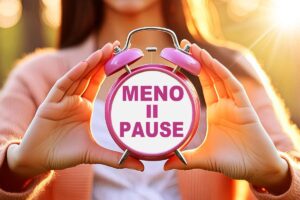
Missing Your Life Before Menopause? How to Manage The Grief and Loss
Do you ever think about life before menopausal symptoms? If you feel a sense of loss or grief, try these emotional coping strategies.
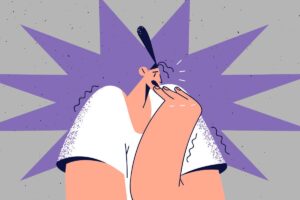
17 Menopausal Anxiety Treatment Options To Ease Your Mind
Feeling anxious during the menopause journey? Try these 16 anxiety treatment options to ease your mind of worry and fear.

